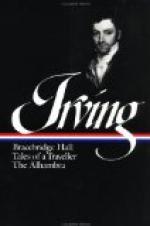I stood in a deep bow window with the Baronet, and could not help expressing my wonder. “After all,” said I, “there are certain mysteries in our nature, certain inscrutable impulses and influences, that warrant one in being superstitious. Who can account for so many persons of different characters being thus strangely affected by a mere painting?”
“And especially when not one of them has seen it!” said the Baronet with a smile.
“How?” exclaimed I, “not seen it?”
“Not one of them?” replied he, laying his finger on his lips in sign of secrecy. “I saw that some of them were in a bantering vein, and I did not choose that the memento of the poor Italian should be made a jest of. So I gave the housekeeper a hint to show them all to a different chamber!”
Thus end the Stories of the Nervous Gentleman.
PART SECOND.
BUCKTHORNE AND HIS FRIENDS.
“’Tis a very good world that
we live in,
To lend, or to spend, or to give in;
But to beg, or to borrow, or get a man’s
own,
’Tis the very worst world, sir,
that ever was known.”
LINES FROM AN INN WINDOW.
LITERARY LIFE.
Among the great variety of characters which fall in a traveller’s way, I became acquainted during my sojourn in London, with an eccentric personage of the name of Buckthorne. He was a literary man, had lived much in the metropolis, and had acquired a great deal of curious, though unprofitable knowledge concerning it. He was a great observer of character, and could give the natural history of every odd animal that presented itself in this great wilderness of men. Finding me very curious about literary life and literary characters, he took much pains to gratify my curiosity.
“The literary world of England,” said he to me one day, “is made up of a number of little fraternities, each existing merely for itself, and thinking the rest of the world created only to look on and admire. It may be resembled to the firmament, consisting of a number of systems, each composed of its own central sun with its revolving train of moons and satellites, all acting in the most harmonious concord; but the comparison fails in part, inasmuch as the literary world has no general concord. Each system acts independently of the rest, and indeed considers all other stars as mere exhalations and transient meteors, beaming for awhile with false fires, but doomed soon to fall and be forgotten; while its own luminaries are the lights of the universe, destined to increase in splendor and to shine steadily on to immortality.”
“And pray,” said I, “how is a man to get a peep into one of these systems you talk of? I presume an intercourse with authors is a kind of intellectual exchange, where one must bring his commodities to barter, and always give a quid pro quo.”




